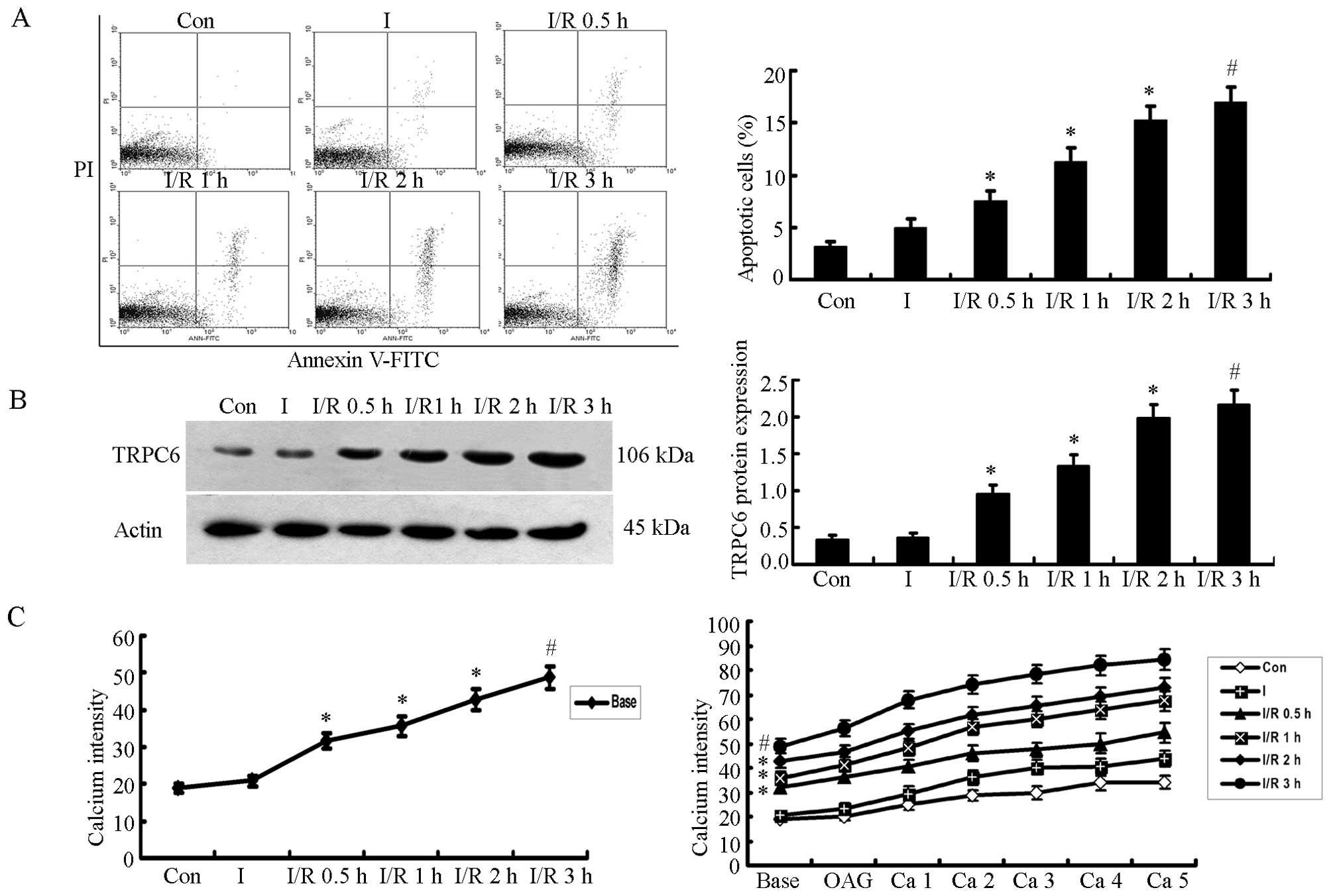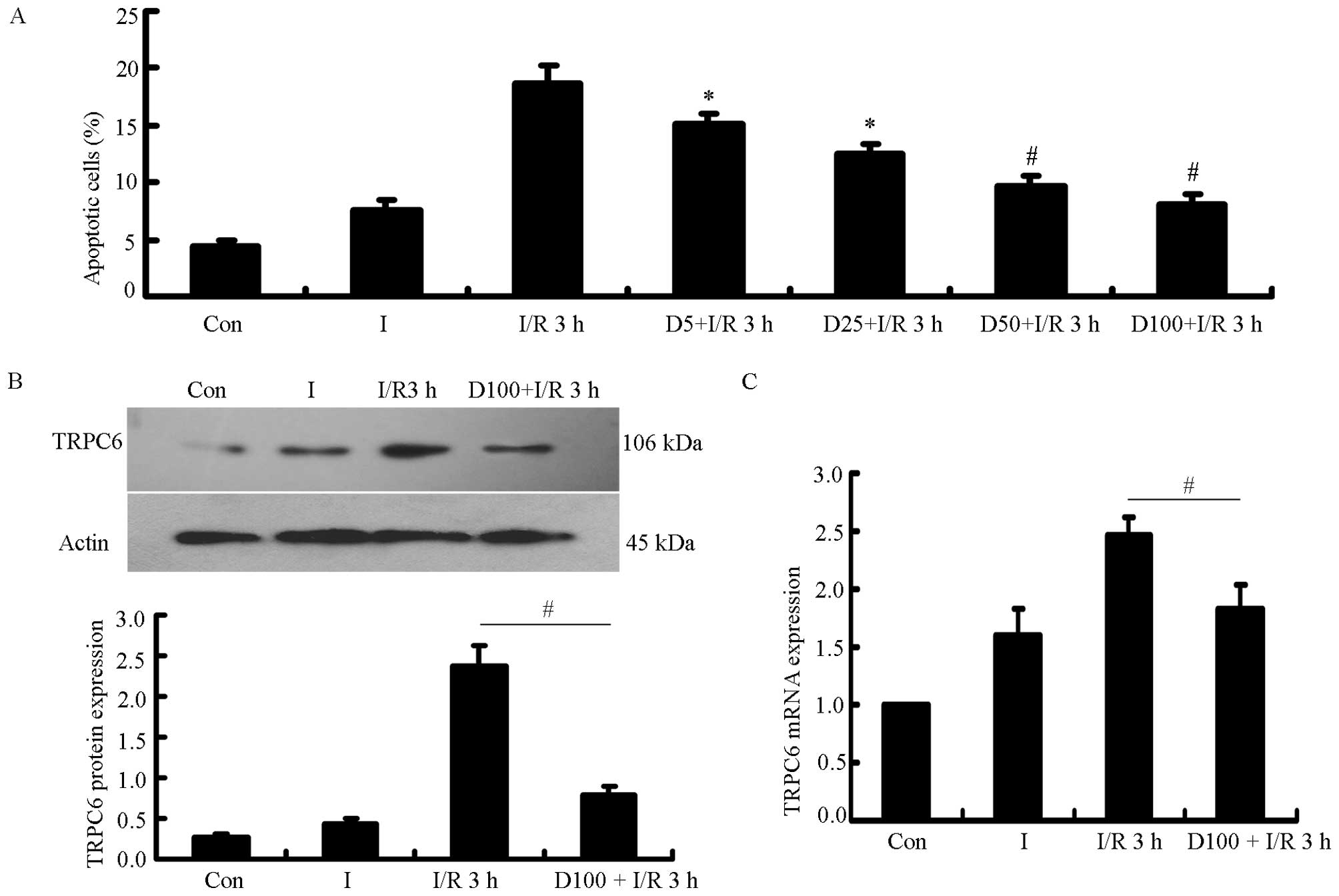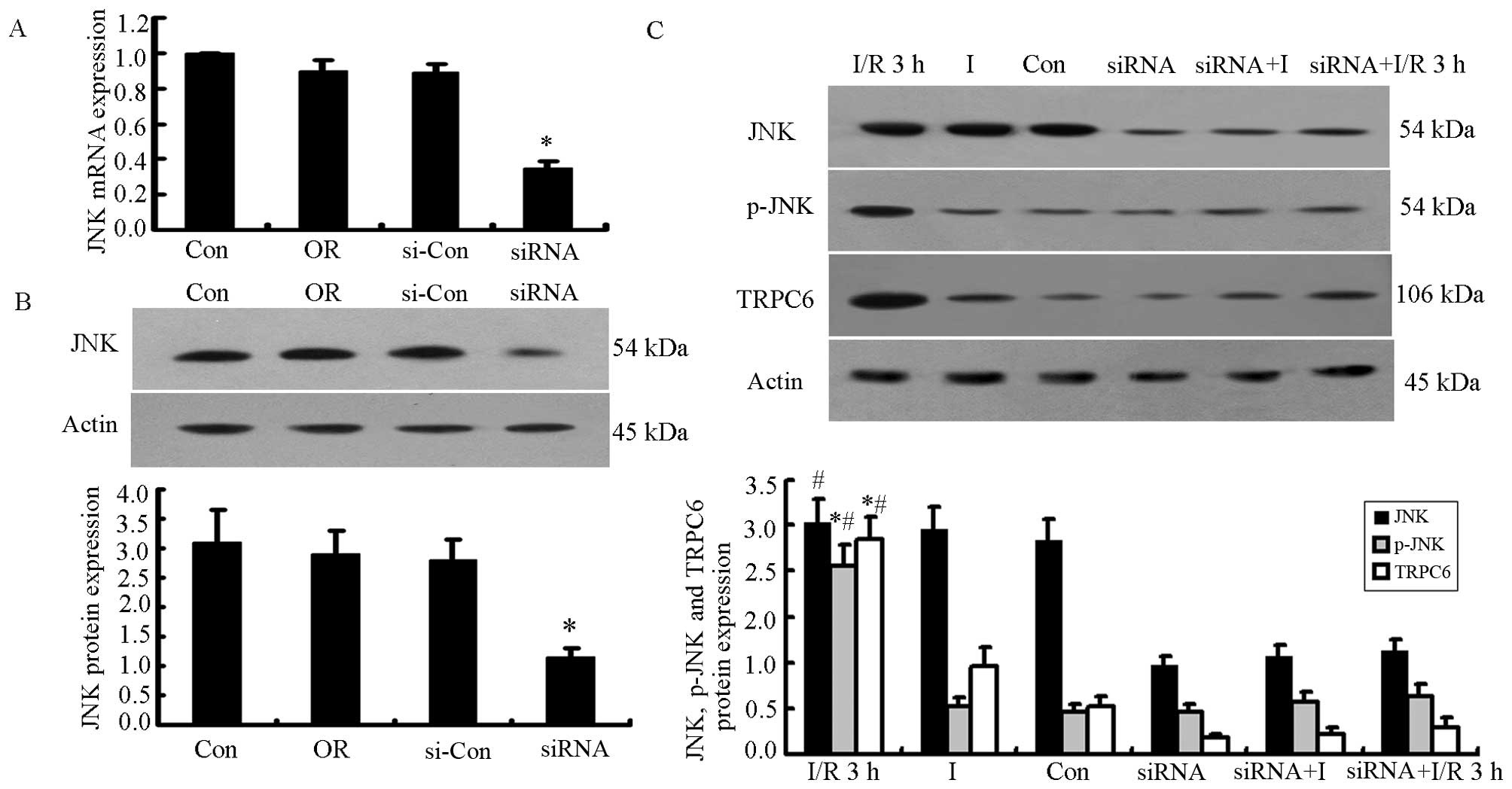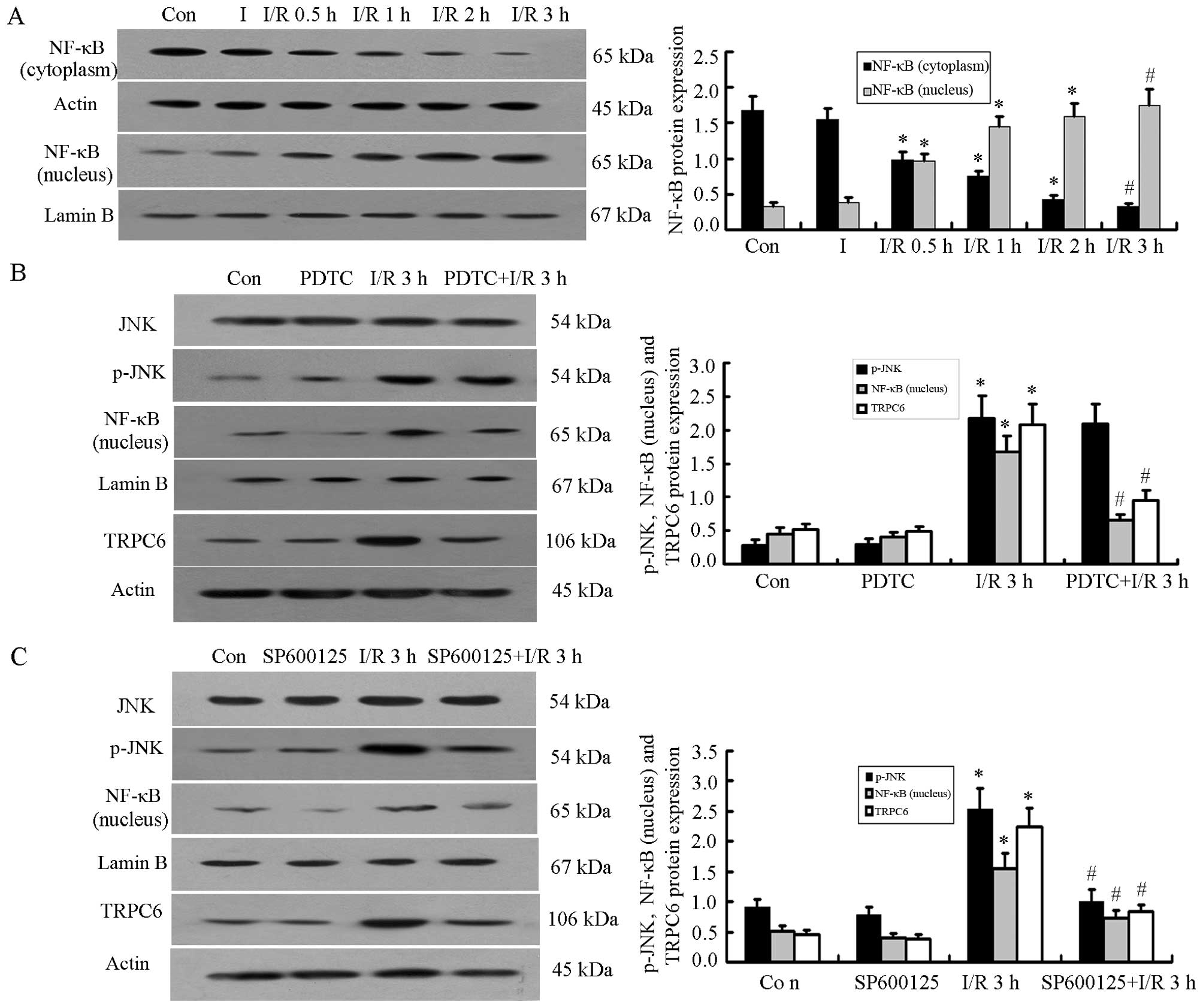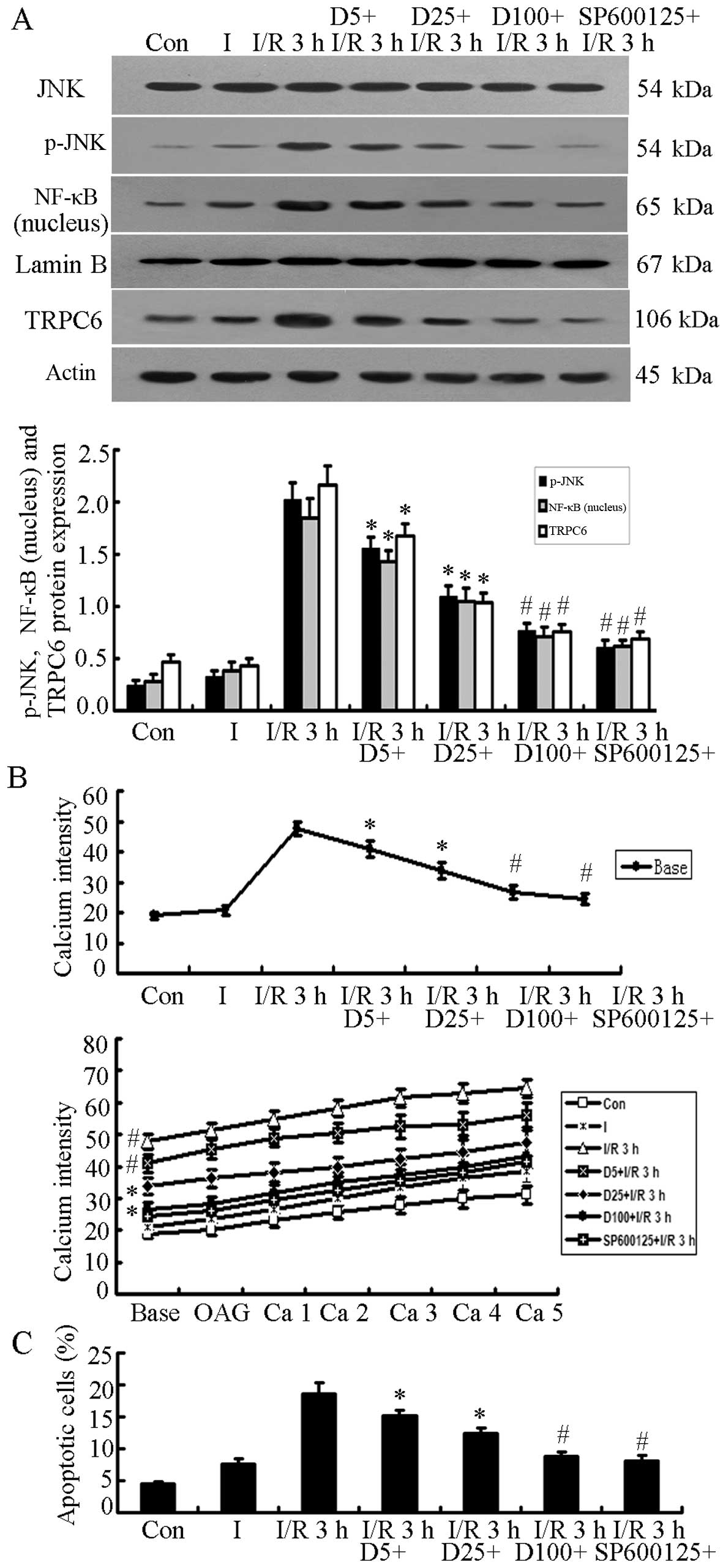|
1
|
Hausenloy DJ, Boston-Griffiths E and
Yellon DM: Cardioprotection during cardiac surgery. Cardiovasc Res.
94:253–265. 2012. View Article : Google Scholar : PubMed/NCBI
|
|
2
|
Powers SK, Quindry JC and Kavazis AN:
Exercise-induced cardioprotection against myocardial
ischemia-reperfusion injury. Free Radic Biol Med. 44:193–201. 2008.
View Article : Google Scholar : PubMed/NCBI
|
|
3
|
Kim TH and Lee SM: The effects of ginseng
total saponin, panaxadiol and panaxatriol on ischemia/reperfusion
injury in isolated rat heart. Food Chem Toxicol. 48:1516–1520.
2010. View Article : Google Scholar : PubMed/NCBI
|
|
4
|
Ferdinandy P, Schulz R and Baxter GF:
Interaction of cardiovascular risk factors with myocardial
ischemia/reperfusion injury, preconditioning, and postconditioning.
Pharmacol Rev. 59:418–458. 2007. View Article : Google Scholar : PubMed/NCBI
|
|
5
|
Jennings RB, Sommers HM, Smyth GA, Flack
HA and Linn H: Myocardial necrosis induced by temporary occlusion
of a coronary artery in the dog. Arch Pathol. 70:68–78.
1960.PubMed/NCBI
|
|
6
|
Shen AC and Jennings RB: Kinetics of
calcium accumulation in acute myocardial ischemic injury. Am J
Pathol. 67:441–452. 1972.PubMed/NCBI
|
|
7
|
Ma HJ, Li Q, Ma HJ, Guan Y, Shi M, Yang J,
Li DP and Zhang Y: Chronic intermittent hypobaric hypoxia
ameliorates ischemia/reperfusion-induced calcium overload in heart
via Na/Ca2+ exchanger in developing rats. Cell Physiol
Biochem. 34:313–324. 2014. View Article : Google Scholar
|
|
8
|
Assayag M, Saada A, Gerstenblith G,
Canaana H, Shlomai R and Horowitz M: Mitochondrial performance in
heat acclimation - a lesson from ischemia/reperfusion and calcium
overload insults in the heart. Am J Physiol Regul Integr Comp
Physiol. 303:R870–R881. 2012. View Article : Google Scholar : PubMed/NCBI
|
|
9
|
Santos EB, Koff WJ, Grezzana Filho TJ, De
Rossi SD, Treis L, Bona SR, Pêgas KL, Katz B, Meyer FS, Marroni NA
and Corso CO: Oxidative stress evaluation of ischemia and
reperfusion in kidneys under various degrees of hypothermia in
rats. Acta Cir Bras. 28:568–573. 2013. View Article : Google Scholar : PubMed/NCBI
|
|
10
|
Benhabbouche S, Crola da Silva C, Abrial M
and Ferrera R: The basis of ischemia-reperfusion and myocardial
protection. Ann Fr Anesth Reanim. 30(Suppl 1): S2–S16. 2011.In
French. View Article : Google Scholar
|
|
11
|
Sirvinskas E, Kinderyte A, Trumbeckaite S,
Lenkutis T, Raliene L, Giedraitis S, Macas A and Borutaite V:
Effects of sevoflurane vs. propofol on mitochondrial functional
activity after ischemia-reperfusion injury and the influence on
clinical parameters in patients undergoing CABG surgery with
cardiopulmonary bypass. Perfusion. Feb 16–2015.Epub ahead of print.
pii: 0267659115571174
|
|
12
|
Fauconnier J, Roberge S, Saint N and
Lacampagne A: Type 2 ryanodine receptor: a novel therapeutic target
in myocardial ischemia/reperfusion. Pharmacol Ther. 138:323–332.
2013. View Article : Google Scholar : PubMed/NCBI
|
|
13
|
Nilius B and Owsianik G: The transient
receptor potential family of ion channels. Genome Biol. 12:2182011.
View Article : Google Scholar : PubMed/NCBI
|
|
14
|
Dietrich A, Kalwa H, Fuchs B, Grimminger
F, Weissmann N and Gudermann T: In vivo TRPC functions in the
cardiopulmonary vasculature. Cell Calcium. 42:233–244. 2007.
View Article : Google Scholar : PubMed/NCBI
|
|
15
|
Watanabe H, Murakami M, Ohba T, Takahashi
Y and Ito H: TRP channel and cardiovascular disease. Pharmacol
Ther. 118:337–351. 2008. View Article : Google Scholar : PubMed/NCBI
|
|
16
|
Zhang J, Mao X, Zhou T, Cheng X and Lin Y:
IL-17A contributes to brain ischemia reperfusion injury through
calpain-TRPC6 pathway in mice. Neuroscience. 274:419–428. 2014.
View Article : Google Scholar : PubMed/NCBI
|
|
17
|
Weissmann N, Sydykov A, Kalwa H, Storch U,
Fuchs B, Mederos y Schnitzler M, Brandes RP, Grimminger F, Meissner
M, Freichel M, et al: Activation of TRPC6 channels is essential for
lung ischaemia-reperfusion induced oedema in mice. Nat Commun.
3:6492012. View Article : Google Scholar : PubMed/NCBI
|
|
18
|
Jones WK, Brown M, Ren X, He S and
McGuinness M: NF-kappaB as an integrator of diverse signaling
pathways: the heart of myocardial signaling? Cardiovasc Toxicol.
3:229–254. 2003. View Article : Google Scholar : PubMed/NCBI
|
|
19
|
Chandrasekar B and Freeman GL: Induction
of nuclear factor kappaB and activation protein 1 in postischemic
myocardium. FEBS Lett. 401:30–34. 1997. View Article : Google Scholar : PubMed/NCBI
|
|
20
|
Kuwahara K, Wang Y, McAnally J, Richardson
JA, Bassel-Duby R, Hill JA and Olson EN: TRPC6 fulfills a
calcineurin signaling circuit during pathologic cardiac remodeling.
J Clin Invest. 116:3114–3126. 2006. View Article : Google Scholar : PubMed/NCBI
|
|
21
|
Hamid R and Newman JH: Evidence for
inflammatory signaling in idiopathic pulmonary artery hypertension.
Circulation. 119:2297–2298. 2009. View Article : Google Scholar : PubMed/NCBI
|
|
22
|
Laderoute KR and Webster KA:
Hypoxia/reoxygenation stimulates Jun kinase activity through redox
signaling in cardiac myocytes. Circ Res. 80:336–344. 1997.
View Article : Google Scholar : PubMed/NCBI
|
|
23
|
Kaiser RA, Liang Q, Bueno O, Huang Y,
Lackey T, Klevitsky R, Hewett TE and Molkentin JD: Genetic
inhibition or activation of JNK1/2 protects the myocardium from
ischemia-reperfusion-induced cell death in vivo. J Biol Chem.
280:32602–32608. 2005. View Article : Google Scholar : PubMed/NCBI
|
|
24
|
Shimizu N, Yoshiyama M, Omura T, Hanatani
A, Kim S, Takeuchi K, Iwao H and Yoshikawa J: Activation of
mitogen-activated protein kinases and activator protein-1 in
myocardial infarction in rats. Cardiovasc Res. 38:116–124. 1998.
View Article : Google Scholar : PubMed/NCBI
|
|
25
|
Wang D, Fan G, Wang Y, Liu H, Wang B, Dong
J, Zhang P, Zhang B, Karas RH, Gao X and Zhu Y: Vascular reactivity
screen of Chinese medicine danhong injection identifies Danshensu
as a NO-independent but PGI2-mediated relaxation factor. J
Cardiovasc Pharmacol. 62:457–465. 2013. View Article : Google Scholar : PubMed/NCBI
|
|
26
|
Yin Y, Guan Y, Duan J, Wei G, Zhu Y, Quan
W, Guo C, Zhou D, Wang Y, Xi M and Wen A: Cardioprotective effect
of Danshensu against myocardial ischemia/reperfusion injury and
inhibits apoptosis of H9c2 cardiomyocytes via Akt and ERK1/2
phosphorylation. Eur J Pharmacol. 699:219–226. 2013. View Article : Google Scholar
|
|
27
|
Pan LL, Liu XH, Jia YL, Wu D, Xiong QH,
Gong QH, Wang Y and Zhu YZ: A novel compound derived from danshensu
inhibits apoptosis via upregulation of heme oxygenase-1 expression
in SH-SY5Y cells. Biochim Biophys Acta. 1830:2861–2871. 2013.
View Article : Google Scholar : PubMed/NCBI
|
|
28
|
Li H, Xie YH, Yang Q, Wang SW, Zhang BL,
Wang JB, Cao W, Bi LL, Sun JY, Miao S, et al: Cardioprotective
effect of paeonol and danshensu combination on
isoproterenol-induced myocardial injury in rats. PLoS One.
7:e488722012. View Article : Google Scholar : PubMed/NCBI
|
|
29
|
Lu H, Tian A, Wu J, Yang C, Xing R, Jia P,
Yang L, Zhang Y, Zheng X and Li Z: Danshensu inhibits β-adrenergic
receptors-mediated cardiac fibrosis by ROS/p38 MAPK axis. Biol
Pharm Bull. 37:961–967. 2014. View Article : Google Scholar
|
|
30
|
Liu XH, Pan LL, Jia YL, Wu D, Xiong QH,
Wang Y and Zhu YZ: A novel compound DSC suppresses
lipopolysaccharide-induced inflammatory responses by inhibition of
Akt/NF-κB signalling in macrophages. Eur J Pharmacol. 708:8–13.
2013. View Article : Google Scholar : PubMed/NCBI
|
|
31
|
Wang T, Fu F, Han B, Zhang L and Zhang X:
Danshensu ameliorates the cognitive decline in
streptozotocin-induced diabetic mice by attenuating advanced
glycation end product-mediated neuroinflammation. J Neuroimmunol.
245:79–86. 2012. View Article : Google Scholar : PubMed/NCBI
|
|
32
|
Wu ZH, Dai LL, Yu BB and Li D: Effect of
danshensu on JNK and NF-kappaB signal transduction of rat hepatic
stellate cells induced by interleukin-1beta. Nan Fang Yi Ke Da Xue
Xue Bao. 29:914–917. 9212009.In Chinese.
|
|
33
|
Mandegar M, Remillard CV and Yuan JX: Ion
channels in pulmonary arterial hypertension. Prog Cardiovasc Dis.
45:81–114. 2002. View Article : Google Scholar : PubMed/NCBI
|
|
34
|
Varro A, Nanasi PP, Acsai K, Virag L and
Papp JG: Cardiac sarcolemmal ion channels and transporters as
possible targets for antiarrhythmic and positive inotropic drugs:
Strategies of the past - perspectives of the future. Curr Pharm
Des. 10:2411–2427. 2004. View Article : Google Scholar
|
|
35
|
Seo K, Rainer PP, Lee DI, Hao S, Bedja D,
Birnbaumer L, Cingolani OH and Kass DA: Hyperactive adverse
mechanical stress responses in dystrophic heart are coupled to
transient receptor potential canonical 6 and blocked by
cGMP-protein kinase G modulation. Circ Res. 114:823–832. 2014.
View Article : Google Scholar : PubMed/NCBI
|
|
36
|
Malczyk M, Veith C, Fuchs B, Hofmann K,
Storch U, Schermuly RT, Witzenrath M, Ahlbrecht K, Fecher-Trost C,
Flockerzi V, et al: Classical transient receptor potential channel
1 in hypoxia-induced pulmonary hypertension. Am J Respir Crit Care
Med. 188:1451–1459. 2013. View Article : Google Scholar : PubMed/NCBI
|
|
37
|
Stiber JA, Tang Y, Li T and Rosenberg PB:
Cytoskeletal regulation of TRPC channels in the cardiorenal system.
Curr Hypertens Rep. 14:492–497. 2012. View Article : Google Scholar : PubMed/NCBI
|
|
38
|
Kiso H, Ohba T, Iino K, Sato K, Terata Y,
Murakami M, Ono K, Watanabe H and Ito H: Sildenafil prevents the
up-regulation of transient receptor potential canonical channels in
the development of cardiomyocyte hypertrophy. Biochem Biophys Res
Commun. 436:514–518. 2013. View Article : Google Scholar : PubMed/NCBI
|
|
39
|
Watanabe H, Iino K, Ohba T and Ito H:
Possible involvement of TRP channels in cardiac hypertrophy and
arrhythmia. Curr Top Med Chem. 13:283–294. 2013. View Article : Google Scholar : PubMed/NCBI
|
|
40
|
Kuwahara K and Nakao K: New molecular
mechanisms for cardiovascular disease:transcriptional pathways and
novel therapeutic targets in heart failure. J Pharmacol Sci.
116:337–342. 2011. View Article : Google Scholar : PubMed/NCBI
|
|
41
|
Yu Y, Keller SH, Remillard CV, Safrina O,
Nicholson A, Zhang SL, Jiang W, Vangala N, Landsberg JW, Wang JY,
et al: A functional single-nucleotide polymorphism in the TRPC6
gene promoter associated with idiopathic pulmonary arterial
hypertension. Circulation. 119:2313–2322. 2009. View Article : Google Scholar : PubMed/NCBI
|
|
42
|
Minamino T: Cardioprotection from
ischemia/reperfusion injury: basic and translational research. Circ
J. 76:1074–1082. 2012. View Article : Google Scholar : PubMed/NCBI
|
|
43
|
Shan D, Marchase RB and Chatham JC:
Overexpression of TRPC3 increases apoptosis but not necrosis in
response to ischemia-reperfusion in adult mouse cardiomyocytes. Am
J Physiol Cell Physiol. 294:C833–C841. 2008. View Article : Google Scholar : PubMed/NCBI
|
|
44
|
Satoh S, Tanaka H, Ueda Y, Oyama J, Sugano
M, Sumimoto H, Mori Y and Makino N: Transient receptor potential
(TRP) protein 7 acts as a G protein-activated Ca2+
channel mediating angiotensin II-induced myocardial apoptosis. Mol
Cell Biochem. 294:205–215. 2007. View Article : Google Scholar
|
|
45
|
Zhang H, Ding J, Fan Q and Liu S: TRPC6
up-regulation in Ang II-induced podocyte apoptosis might result
from ERK activation and NF-kappaB translocation. Exp Biol Med
(Maywood). 234:1029–1036. 2009. View Article : Google Scholar
|
|
46
|
Jia P, Wang J, Wang L, Chen X, Chen Y, Li
WZ, Long R, Chen J, Shu YW, Liu K and Wang ZH: TNF-α upregulates
Fgl2 expression in rat myocardial ischemia/reperfusion injury.
Microcirculation. 20:524–533. 2013. View Article : Google Scholar : PubMed/NCBI
|
|
47
|
Ben-Ari Z, Avlas O, Fallach R,
Schmilovitz-Weiss H, Chepurko Y, Pappo O and Hochhauser E: Ischemia
and reperfusion liver injury is reduced in the absence of Toll-like
receptor 4. Cell Physiol Biochem. 30:489–498. 2012. View Article : Google Scholar : PubMed/NCBI
|
|
48
|
Hai L, Kawarabayashi Y, Imai Y, Honda A
and Inoue R: Counteracting effect of TRPC1-associated
Ca2+ influx on TNF-α-induced COX-2-dependent
prostaglandin E2 production in human colonic myofibroblasts. Am J
Physiol Gastrointest Liver Physiol. 301:G356–G367. 2011. View Article : Google Scholar : PubMed/NCBI
|
|
49
|
Yu L, Lin Q, Liao H, Feng J, Dong X and Ye
J: TGF-β1 induces podocyte injury through Smad3-ERK-NF-κB pathway
and Fyn-dependent TRPC6 phosphorylation. Cell Physiol Biochem.
26:869–878. 2010. View Article : Google Scholar
|
|
50
|
Pan Y, Zhang X, Wang Y, Cai L, Ren L, Tang
L, Wang J, Zhao Y, Wang Y, Liu Q, et al: Targeting JNK by a new
curcumin analog to inhibit NF-κB-mediated expression of cell
adhesion molecules attenuates renal macrophage infiltration and
injury in diabetic mice. PLoS One. 8:e790842013. View Article : Google Scholar
|















